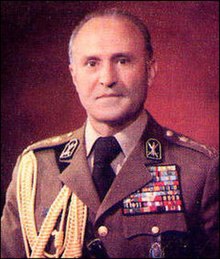|
Abbas Gharabaghi
 Arteshbod Abbas Karim Gharabaghi (Persian: عباس کریم قره باغی; 9 February 1918 – 13 October 2000)[1] was an Iranian general who was the last chief of staff of the Iranian Armed Forces as well as deputy commander-in-chief of the Iranian Imperial Army under the rule of Mohammad Reza Pahlavi, the last Shah of Iran. Gharabaghi was one of two senior military officials who were not detained and executed by the Islamic Revolutionary Council. With Fardoost, he convinced the army to get a neutral position as he was linked with the Revolutionary and foreign intelligence forces. [2] Background and careerBorn in Tabriz, Gharabaghi was of Azerbaijani origin.[3][4] He served as the gendarmerie commander until 1979.[5] When the Iranian Revolution broke out in 1978, both Hassan Toufanian and Amir Hossein Rabii planned to carry out a coup to stabilize the turmoil in the country. However, the idea failed as it was not backed by other senior military officials, including Gharabaghi.[6] Gharabaghi was appointed chief of staff of the Iranian Armed Forces on 7 January 1979. His job entailed defending the monarchy until the Shah left Iran and then supporting the new civilian government led by Shapour Bakhtiar. However, on 11 February 1979, after much strife on the streets of Tehran and elsewhere, Gharabaghi and with twenty-two other senior military leaders withdrew support of Bakhtiar, thus tacitly giving approval to the revolutionary Islamic Republic.[7][8] Gharabaghi was then assigned as a prosecutor to the Islamic Revolutionary Court, which ordered the killing of many senior Iranian officials who served under the Shah.[3][9] However, as a result of tensions in Azerbaijan, in 1979 Gharabaghi's relations with Ayatollah Khomeini became tense and he fled from Tehran.[3] The revolutionary authorities sought him, but did not manage to arrest him.[3] In December 1979, a report outlined the exiled Shah's belief that the covert meetings earlier in January of that year between U.S. General Robert E. Huyser and Khomeini representative Mehdi Bazargan were organized by Gharabaghi.[10] He further accused Gharabaghi of being a traitor.[11] WorksGharabaghi published his account of the revolution in his books Haghayegh Darbareye Bohran-e Iran ("Facts About the Iran Crisis", 1983), and Che Shod Ke Chonan Shod? (translated as "Why did it happen?", 1999).[12] He argued that his decision to declare the army's "neutrality" was the main reason for the final triumph of the Islamic Revolution. In his first book, Gharabaghi expresses his strong support for and loyalty to the Shah and paints a detailed picture of the chaos within the military ranks during the final days of the government, placing the blame on Prime Minister Bakhtiar for its collapse.[13] He justifies his decision to declare the army's "neutrality" as the only reasonable solution given the circumstances in order to prevent further bloodshed, calling Bakhtiar a traitor. DeathGharabaghi died in Paris in 2000. He is buried in the Père Lachaise Cemetery (division 19),[14] in Paris. References
External links
|
||||||||||||||||||||||||||||||||||||||||||||||||||||||

